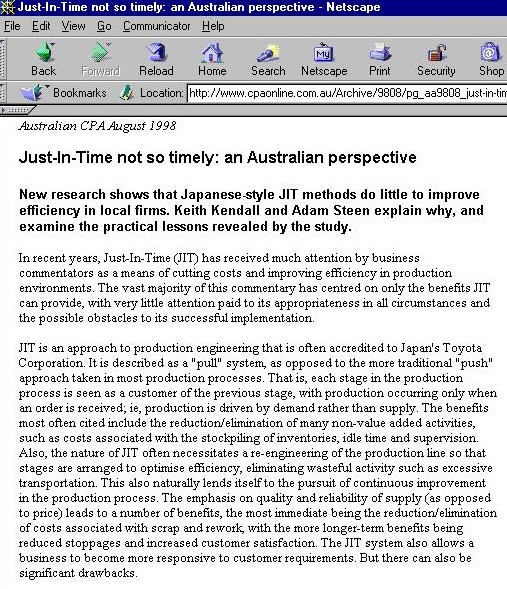Just In Time
- part of studying Supply Chain Management.

| JIT
Just In Time - part of studying Supply Chain Management. |
 |
| INTRODUCTION | In a number
of the courses I teach, we will discuss Japanese business concepts which
have had some effect on North American and European business. These concepts
are not necessarily original to Japan, but they have been nurtured there
by Japanese cultural considerations which are unique.
The concepts we will discuss are
In the 1980's and early 1990's, many large Japanese companies set up manufacturing operations in North America. As they acquired North American companies (like Bridgestone's takeover of Firestone, and SONY's takeover of Columbia Pictures) the Japanese corporate leadership spread their management style to their subsidiary companies and many non-Japanese learned basic Japanese terms for business practices. In Japan in the 1980's, space was a premium. Manufacturing processes had to deal with space restrictions for warehousing, assembling etc. One of the way companies saved money was to have their suppliers send the components just when it was time to use them - meaning you did not have to store supplies in advance, they's be delivered just in time to put them into the product you are assembling. WTGR |
 |
Video discussing
how J.I.T. can allow a company to save money by buying component parts
or supplies in smaller quantities, which may be appropriate if you want
to change how a product is produced during the period you are making it,
or if you want the supplier to change some physical aspect of the part
to better fit something the customer has asked for.
youtube.com/watch?v=RxTbkSg6v_s video made in BUS106 at Seneca Wednesday morning Nov 16th 2011 with the contribution of Leor G. using an example from his parent's business, and videographer Brooke M. |
| JIT
Just In Time |
Industry activities to deal with enhancing effectiveness of Supply Chain Management
information competitiveness What has changed in the millennium is the need to quickly share and disseminate information across the supply chain, - this follows a shift from product orientation, to sales orientation to market orientation. Pull versus Push Supply Chain
models
- Pull based models
require
a lot of information about the customer
If Pull based models require a lot of information about the customer, then one of the corollaries about the spread of Pull Supply Chain Models is the requirement for better intelligence about customers. One of the consequences, for international business, is a more sophisticated approach to gathering data on international customers in order to be more effective at Supply Chain management on a global basis - in turn to be more competitive. |
| Problems
associated with J.I.T. |
 |
| Scott Adams "Dilbert" is
funny, but also a great way to illustrate some essential business terms.
In this particular cartoon, the point about J.I.T. is that companies who
adopt J.I.T. are doing it to save time and money, but they are also then
putting themselves into a position vulnerable to problems of the suppliers
- particularly time sensitive problems
These problems could be - weather problems - labour/union problems - regulatory changes |
| Problems
associated with J.I.T. |
- breaking down
due to local government problems
o road repair o municipal services o electricity, garbage removal, recycling - things which make it difficult for the J.I.T. to happen "in Time" |
| Problems
associated with J.I.T. |
Australians
have a lot of experience dealing with Japanese business culture so it is
interesting to read about their negative reaction to some aspects.
"The first issue - and arguably the source of all the other problems - is that the entire JIT philosophy is based on eastern cultural characteristics. As with other management accounting innovations which have emerged from Japan, it is reasonable to anticipate that there will be significant implementation impediments when these concepts are applied to western businesses." |
 |
UTSC MGTC46
student Venelina G., in July 2009, emailed to say
I
read an interesting article in the National Post. It's called
"Railways key to jet-fuel prices" and can be found at
|
| Veneline says
"Since
airlines use specific jet fuel, such kind of fuel needs to be produced
just for airlines services. Canadian manufacturers have switched
from producing such fuel to producing diesel (they cannot
|
 |
"What
I found very interesting is that Air Canada used to have its fuel
delivered to a port in Quebec by a tanker and put on trucks to
Pearson. In order to further improve their processes and make it more cost feasible they have decided to create a huge warehouse facility for jet fuel storage. " |
| Veneline concludes
"With this facility in place jet fuel will be transported to Pearson by train. The Canadian Pacific Railway has direct access to the facility, so the train would actually go into the facility in order to deliver the fuel. "This is related to JIT because trains do not get into traffic jams and are not greatly affected by weather conditions, so Air Canada would be able to precisely measure when fuel needs to be delivered to them and exactly how long this would take. Although the article explains that the facility would have a large storage capacity, I think Air Canada would rather use JIT, ...after all jet fuel is extremely flamable and there are currently a lot of unsatisfied Air Canada employees and pensioners." I hope you find this interesting" |

.
|
|
CONTACT I MAIN PAGE I NEWS GALLERY I E-BIZ SHORTCUTS I INT'L BIZ SHORTCUTS I MKTG&BUSINESS SHORTCUTS I TEACHING SCHEDULE |
| . | |
| MISTAKES ITEXTS USED I IMAGES I RANK IDISCLAIMER I STUDENT CONTRIBUTORS I FORMER STUDENTS I | |
| . |